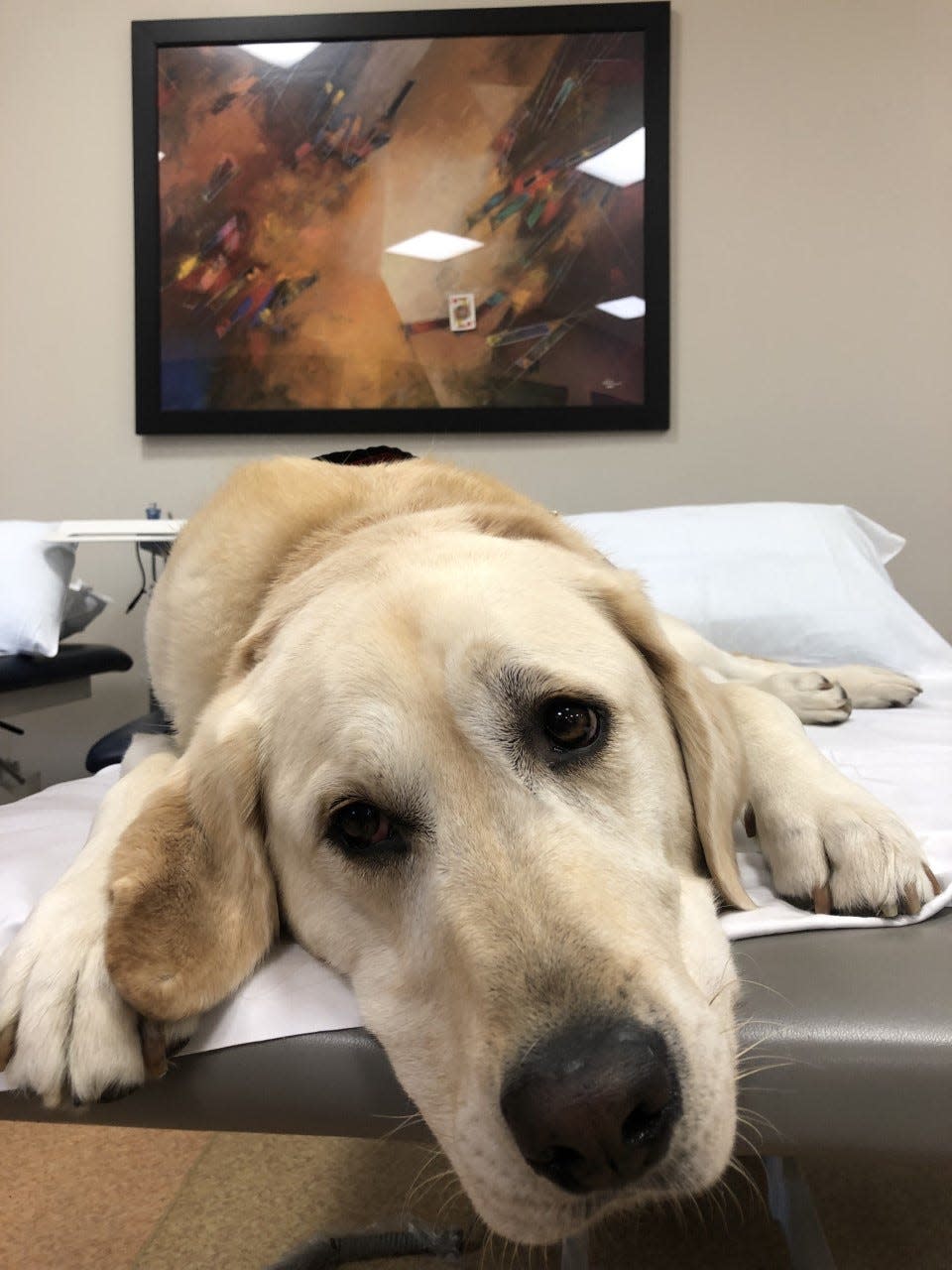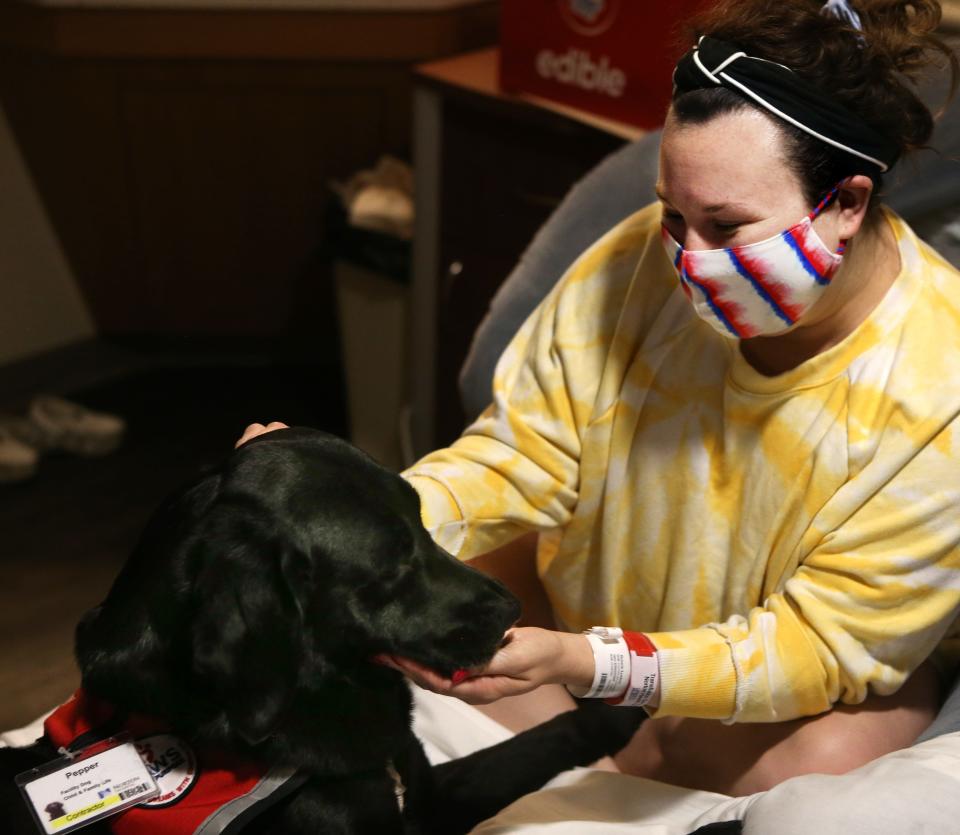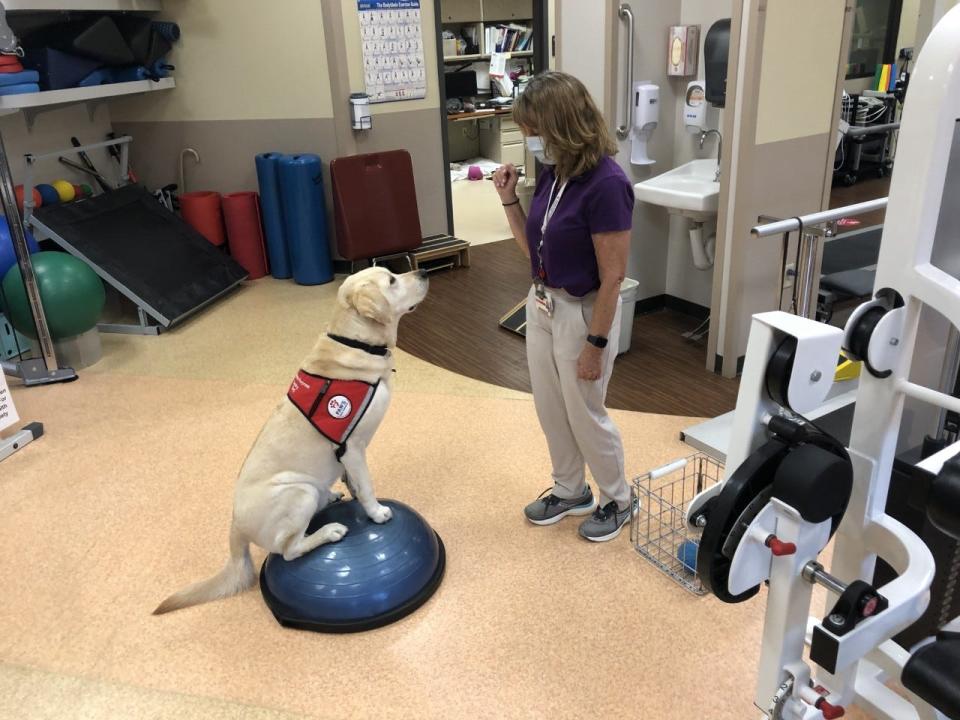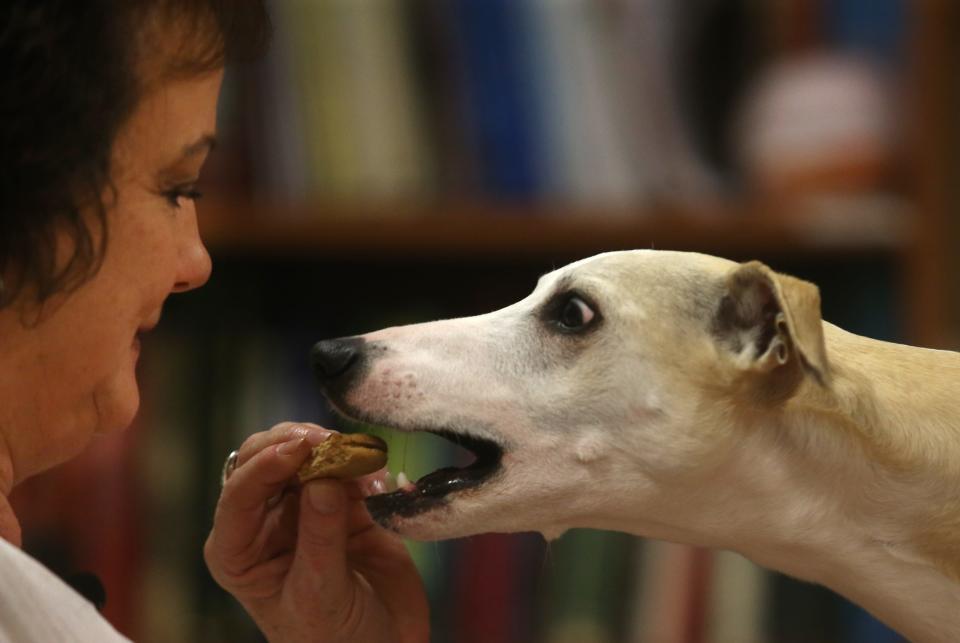How these dogs play a big role in healing Louisville hospital patients
Lindsey Howard beamed the moment Pepper walked through her hospital room door and hopped up onto the bed, tail wagging.
The 5-year-old facility dog at Norton Hospital stretched out at the foot of Howard's bed for pets and leg scratches.
"The hardest part about being here is being away from my own dogs," said Howard, who was at Norton on bed rest, waiting to have her twin girls. Her other two girls, Remmi and Stella, a beagle and a boxer, were back home in Paducah.
Facility dogs like Pepper spend years being trained on how to be calm and comforting for patients going through emotionally charged times — such as undergoing a serious surgery, giving birth or even as the end nears.
Dogs in Paws with Purpose: These dogs help us. Let's help them.
Unlike therapy dogs, facility dogs hold jobs and work shifts, arriving with their handlers to help people heal. Mostly, they do this by making themselves available for pets for cuddles. But they also can actively help with physical therapy.
"It's really nice to have … a big dog cuddle. This is what my dogs do at home. So, it feels a little bit more like home," Howard, 30, said while stroking Pepper's fur. "She makes me feel like she loves me."
Pepper is one of nine facility dogs in the Norton system. The golden retriever and Labrador mix is a veritable celebrity — as she walked through Norton's halls Friday, employees in scrubs flocked to scratch her belly, smile and call out "Pepper!"
She climbed gently into the bed of a patient who just underwent surgery to remove a stomach tumor and let him touch her head and paws. She paused to climb on a bench so a man in a hospital bed being wheeled down the hall could smile at her. At U of L Health, facility dog Travis helps with physical therapy, using his skills and body to help patients regain mobility.
With one pat on a patient's knee, Travis will come and lay his head across that knee for visits and pets. While the act of petting a dog is emotionally comforting, it can also encourage mobility and strength as a patient moves their arm back and forth, said Cathy Gerrish, Travis' handler and a U of L physical therapist.
Travis, 5, will nose a ball across the floor to a physical therapy patient so they can work on balance while they lift one foot to kick it back to him.

The golden retriever and Labrador mix also uses his mouth to pull shoes off of patients' feet if they can't. He helps patients cross their legs by planting his head under the knee and lifting the leg up and over. He also lies still while patients take treats and, leaning forward on one leg for balance, place them on his head.
When the exercise is done, he gets to eat those treats.
Sue Wettle, the vice president of Louisville dog-training nonprofit Paws with Purpose, said getting dogs desensitized to noise and activity takes a lot of time, but it's necessary. Trainers do that through immersing dogs in lobbies and elevators — places full of noise. Trainers reward calm behavior in hectic situations.
Facility dogs must be able to keep completely still while comforting a child getting stitches, an IV or a blood draw.
These dogs also have to be willing to be role models, too: To calm a nervous child who needs a bandage changed, hospital staff might bring in a facility dog and change a fake bandage on it, too.

Walking down a hall as an act of physical therapy might seem scary for some, Wettle said. But once there's a dog walking alongside the patient or waiting at the end of the hall, "it's not such a scary thing anymore."
Therapy dogs: Traveling can be stressful, but the Louisville airport has a solution — therapy dogs
Facility dogs aren't the only furry friends working in Louisville hospitals. Several also have assistance and therapy dogs, typically pets, who come in to visit with staff and patients periodically with their owners.
Nicole Crum, the director of volunteer services at Baptist Health Louisville, coordinates requests for dog visits with the hospital's partner, Louisville nonprofit Wonderful Animals Giving Support (WAGS).
COVID-19 forced dog visits with patients, part of a program that started in 2005, to pause. The hospital hopes to resume those visits in June.
Linda Laun, who founded WAGS and started working with Baptist 22 years ago, said there's an "innate connection between humans and animals" that causes therapy dogs to be so effective in helping people recover from illness or injury.

Since launching the program, 50 dogs have come through Baptist halls to comfort both patients and staff.
"They're not judgmental," said Laun, explaining why sick people might be so receptive to dogs. "They don't give advice. They don't tell you what to do. They're just there for you to enjoy."
How do dogs comfort us?
Dr. Teah Moore, the director of Spalding University's Clinical Mental Health Counseling program, said dogs can cause our human brains to release chemicals like dopamine and serotonin that can make us feel happy or less stressed.
In addition, seeing a dog in a hospital setting can be a nice distraction from pain or medical routine, Moore said. A dog can reshape surroundings and as a result, shift how a person sees their situation.
A person who had a positive past experience with a dog will see a therapy or facility dog and be reminded of their own pet or of happy times, Moore said.
"I think it takes us back to our childhood or to those good feelings, those good experiences," she added.

Dogs are also great motivators when it comes to physical therapy, she said. She pointed to her own experiences with her chihuahua mix, Cisco: She might not want to get up and go for a walk, but having the responsibility of walking him makes it an easier task.
"It does help with some psychological distress if we have those opportunities to nurture something, those opportunities to feel connected to something else," Moore said.
The American Psychological Association found in 2011 that people with pets were more confident, in better shape and less lonely than people who did not have pets.
Why dogs win: There's a reason humans melt when they see 'puppy dog eyes,' new research reveals
A 2012 study published in the National Library of Medicine found animal assisted therapy in emergency department settings was both well-received and beneficial for patients.
And the American Journal of Critical Care published a study in 2007 that looked at dogs' impact on people hospitalized with heart failure and found "animal-assisted therapy improves cardiopulmonary pressures, neurohormone levels, and anxiety in patients."

Other studies have shown that positive interactions between people and their dogs release oxytocin in the brain, which combats stress.
Louisville zoo update: Zoological Gardens debuts African elephant Mikki's baby bull calf
"I really feel that people are in a no-judgment zone when they’re in the company of a dog," said Cathy Gerrish, Travis' handler. "I witness people completely change their personalities when Travis comes around. I feel like they’re saying inside 'I can just relax and be myself.' Dogs love unconditionally. We would all be better humans if we could follow a dog‘s lead."
'I think he knows … he's helping people'
As COVID-19 raged in September 2020, Pamela Parson received some devastating news: She had acute promyelocytic leukemia.
The Elizabethtown woman was sent to U of L's Brown Cancer Center to undergo a series of chemotherapy treatments. She didn't even have time to say goodbye to her 8-year-old lab-pit bull-mastiff dog, Luke.
She was covered in unexplainable bruises and her nose wouldn't stop bleeding. She needed to start treatment as soon as possible, so she came to Louisville by ambulance for her first 30 days of treatment.

There, she got a pleasant surprise: a U of L therapy dog came to see her.
Oakley, a 6-year-old Whippet who recently won a national award for his therapy work, came to see Parson every Friday with his handler, Maddie Petit. He sat with her about 20 times for 30-40 minutes at a time while she got infusions, which Parson said caused her stress and anxiety at times.
But Oakley "calmed me," she said. He "made it a lot easier … the whole journey."
Oakley and Parson bonded quickly — the peanut butter crackers he found in her purse were a nice bonus — and visited regularly throughout her treatment.
"It was very important for me to see him because it was just really difficult," said Parson, 55, who is now in remission. Oakley provided companionship during a lonely time. "I was away from my dog. My mom … she suffers dementia. And she didn't really understand what was going on."
With COVID-19 protocols keeping most visitors out of hospitals, Oakley's companionship was even more valuable.

Pet tips: Healthy pet, healthy you: 6 ways your health is inextricably linked with your dog’s
"Dogs just are amazing. And this one is pretty smart," Parson said. "And I think he knows what he's doing here — that he's helping people. I don't think I could have made it if I didn't get to see this boy every Friday."
"I think every facility should have therapy dogs," she said. She still has to come into Louisville to get her blood checked every three months for three years.
She hopes to see Oakley at future visits.
Reach health reporter Sarah Ladd at sladd@courier-journal.com. Follow her on Twitter at @ladd_sarah.
This article originally appeared on Louisville Courier Journal: Louisville hospitals: How facility dogs help patients heal

